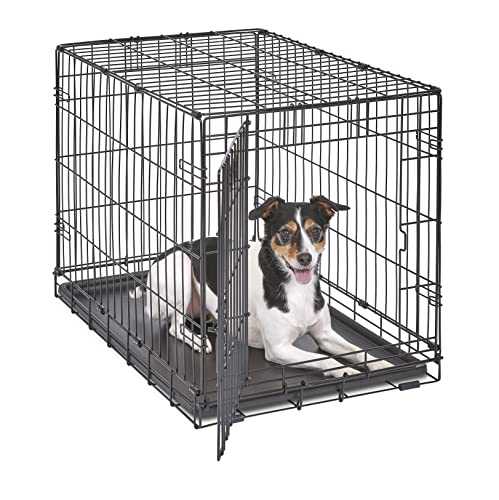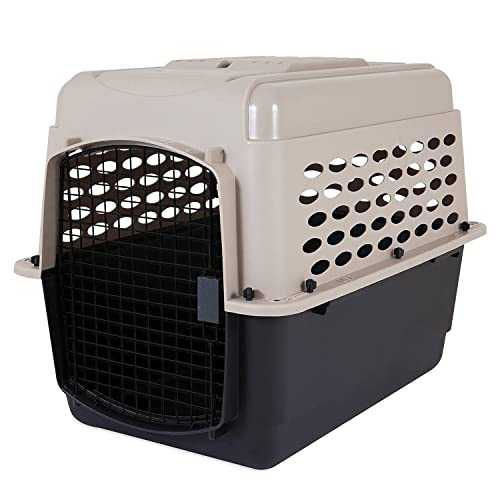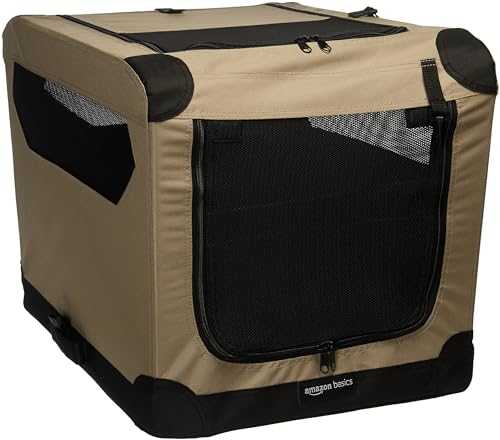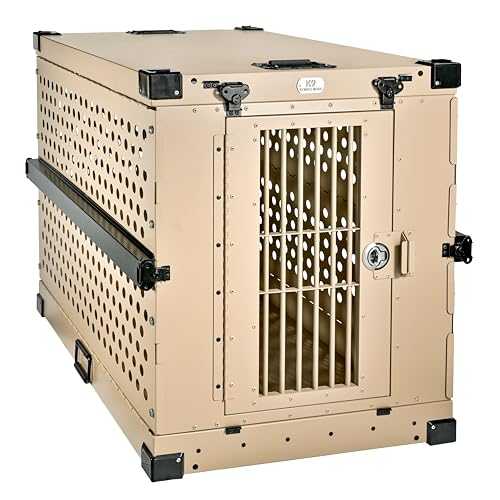Our evaluations and opinions are not influenced by our advertising relationships, but we may earn a commission from our partners’ links. This content is created independently from TIME’s editorial staff. Learn more about it.
Whether you’re bringing a new puppy into your home or are adopting an older dog, crate training is an important step in helping to keep them safe and out of trouble, especially when you’re not around to supervise. Crates also resemble dens, where dogs naturally find security and safety. Crate training your dog means they'll have a safe spot to relax.
Crate training isn’t an overly complicated process, but it’s important that you choose a safe crate, understand the basics of the training process, and know what to expect before you start working with your dog. I spoke with a dog training and behavior specialist, and a veterinarian, to find out how you can best crate train your dog or puppy at home. Read on for their advice.
Crating caution
Cindy Chiacchere, owner/president of Royal Paws in Babylon, New York, is a certified master canine handler, trainer, and behaviorist. She is also Chairman of the Board of Auxiliary K9. Chiacchere explains that dog owners need to ensure they choose safe equipment when crate training a puppy or dog.
“Look over any crate, even if it’s brand new, to make sure there are no wires bent out, wires that aren’t soldered properly, or sharp edges,” she recommends. Additionally, if someone loans you a crate, take the time to evaluate it, and run your hand over the sides to check for any sharp edges where your pet will lie down.
Additionally, Chiacchere notes that it’s important not to have any equipment on your dog when you put them in the crate. Take off any collars or leashes, which can potentially get caught up, to help keep your dog safe.
Why is crate training a puppy important?
According to Chiacchere, crate training a dog is extremely important for their safety. “Puppies’ brains are not fully developed until they’re 18 months old,” she explains. Even though a larger puppy might seem capable of having freedom and safely roaming around the house, crate training that dog helps to keep them safe until they’re fully mature.
Chyrle Bonk, DVM, veterinarian and Pet Care Consultant at Dogster.com, has more than a decade of experience in a mixed animal clinic. Dr. Bonk explains that crate training puppies helps to set them up for adulthood. “Crate training is often a great first step in house training, and it provides your puppy with a lifelong safe and comfortable place to go when they’re stressed or fearful,” she says. Crate training allows you to keep your puppy confined when you’re not home, preventing them from chewing on things.
Crate training can also signal to a dog when they’re off-duty. “In the case of guarding breeds, they always feel like they have to work,” says Chiacchere. “If they have a space where they’re contained, it’s representative of what they know as a den, and it allows them to be off duty.” As a result, dogs can get more restful sleep in their crates.
Types of crates
There are many types of dog crates available, so to start, you’ll need to choose a crate that’s right for your dog. Chiacchere recommends that dog owners use a basic black wire crate. “It’s the most convenient and easy to handle, and it comes with dividers so your dog can grow into [it],” she explains. These wire crates give your dog an excellent view of their surroundings. Chiacchere recommends placing the crate in an area of your home that gets the most exposure or family time, so your dog can be in the crate playing with a toy while you’re doing something else.

MidWest Homes for Pets Newly Enhanced Single Door iCrate Dog Crate, Includes Leak-Proof Pan, Floor Protecting Feet , Divider Pane l & New Patented Features
Alternatively, you might choose to use a plastic crate. Chiacchere notes that these crates are typically geared more toward travel and resemble the feel of a den a bit more than a wire crate. “It makes the dog kind of snug in there, and is good for long trips,” Chiacchere explains.

Petmate Vari Dog Kennel 32", Taupe & Black, Portable Dog Crate for Pets 30-50lbs, Made in USA
You can also purchase soft travel crates which are made of fabric like polyester with netting for ventilation and visibility. “They’re for short trips so you can have some kind of containment, like in a hotel room,” says Chiacchere. She notes you can also find heavy-duty impact crates and aluminum crates designed for working dogs.

Amazon Basics - 2-Door Portable Soft-Sided Folding Soft Dog Travel Crate Kennel, Small, Tan, 26.0"L x 18.1"W x 18.1"H

K9 Kennel Boss - Heavy Duty Fully Collapsible Powder-Coated Aluminum Dog Crate - Large (Tan)
In addition to the type of crate, it’s important to choose one that’s the right size for your dog. “You want [a crate] that is big enough for a pup to stand up and turn around in, but not any bigger than that or they may use the extra space as a bathroom,” says Dr. Bonk. She recommends that you choose a durable model made of hard plastic or wire, and it should also have a latch that your dog can’t open. “Being easy to wash is also a definite plus,” she says.
The training process
Chiacchere explains that if you purchased a young puppy from a quality breeder, most breeders will have started the crate training process for you. However, you can also train an older dog using these steps that Chiacchere provides.
Create a welcoming crate environment
Start by setting up the crate and making it as appealing as possible. Chiacchere suggests adding a blanket to make it cozy, but be sure to avoid anything containing stuffing, since puppies like to rip stuffing out of beds and toys. “A beach towel is perfect,” she says.
Add a couple of different types of toys, such as a toy that makes a sound, something that’s good for chewing, and possibly a ball.
Give your dog the chance to enter the crate
Leave the crate door open and play with your dog in the area. “If they show any interest in the crate, have a party and praise your dog with a happy, excited voice.” She recommends creating a phrase, such as “go home” or “go in your room” that you will use when you eventually ask your dog to go into the crate.
Let your dog get acclimated
Once your dog enters the crate, don’t immediately close the door. Instead, let them explore a bit and get comfortable. Only close the door once your dog is comfortable being inside the crate with the door open.
Watch your dog’s reactions
“How you react to what your dog is doing once the door is closed is very important,” says Chiacchere. If your dog is relaxed and happy, continue on with your day. When they’re napping, or you feel they’re comfortable and it’s time for them to come out, you can open the crate door and let them out.
If your dog starts to cry when you close the crate door, Chiacchere encourages ignoring some of the crying. “If you run right to your dog and give them too much affection or soothing voices, then you’re telling them that you’re scared, too, and you don’t really know if you should keep them in there.” Instead, tell your dog “You’re fine, that’s enough,” and walk away.
Chiacchere explains that the more you talk to your dog and try to soothe them, the more it supports their fear, anxiety, or frustration. “Your actions are actually what tell them they’re fine,” she says. “Once you establish that, they will learn to accept that as natural and normal.”
Repeat the process
As you train your dog, repeat these sessions in the crate. Keep the sessions positive and gradually increase the amount of time that your dog spends in their crate. Remember to only let your dog out of the crate when they are calm.
Keep in mind that a crate simulates the den where wild dogs would live. “The only difference we’re creating is we have control when your dog can go in and out,” explains Chiacchere.
How long does it take to crate train a dog?
According to Chiacchere, the amount of time it takes to crate train a dog will depend on your dog’s temperament. She notes that crate training very dominant dogs or older dogs can be a bit harder than training more submissive dogs. How you respond to your dog will play a role, too. If you establish the fact that you’re in charge and that your dog simply has to be in a crate, your dog will accept that. But if you feel bad and give in when your dog barks, your dog will learn to bark more.
“Crate training can happen as quickly as in an hour, or it can take other people two weeks before they can get a dog to stop barking,” Chiacchere says. “Unless there’s been some sort of trauma to a dog involving a crate, it should still be something that comes naturally to them, so it should still be something that they can learn. Sometimes it just takes a lot of patience.”
Tips for making crate training a puppy successful
Dr. Bonk notes that patience and consistency are essential in crate training a puppy. “Also, reward good behavior and ignore bad behavior,” she says. “Don’t let your dog out and reward them if they are whining or scratching at the door. Instead, wait until they are quiet.”
Potential problems
Chiacchere explains that since the crate becomes your dog’s safe space, kids and other pets shouldn’t go into the space. “If pets stay together often, I recommend every dog have their own crate,” she says. “If the crates are open and a dog runs in with another and they curl up and sleep, great, but if you’re leaving and locking them in, it’s safer for each dog to have their own space.”
Frequently asked questions (FAQs)
What age is too late to crate train a dog?
According to Chiacchere, unless a dog has experienced trauma relating to a crate, there really isn’t an age where it’s too late to crate train a dog. Crate training may take a little longer if your dog is older, though.
How do I get my puppy to stop whining in their crate?
Dr. Bonk explains that if your puppy is whining, it’s important to first make sure that all of the pup’s needs are met. “Make sure that they don’t have to potty, eat, or drink,” she says. If your puppy is whining just because they want out, then you’ll need to ignore the behavior. “You may have to leave the room,” she says. Once your puppy is quiet, you can let them out of the crate.
Should you crate train your dog at night?
Yes, crate training can be a valuable tool to use anytime you’re not available to supervise your dog, including at night. “Crate training at nighttime is great because it gives your dog a safe, cozy place to sleep and keeps them out of trouble,” says Dr. Bonk. “It also helps with housetraining.”
What is a good crate training schedule?
Dr. Bonk explains that most dogs will need a couple days with each step of the crate training process. “So, a couple of days to accept the crate, a couple of days to become comfortable inside it with the door open, and a couple of days to be comfortable with the door closed,” she says. “However, some dogs will take these steps within a few hours, and others may take a few weeks.”
The information presented here is created independently from the TIME editorial staff. To learn more, see our About page.

